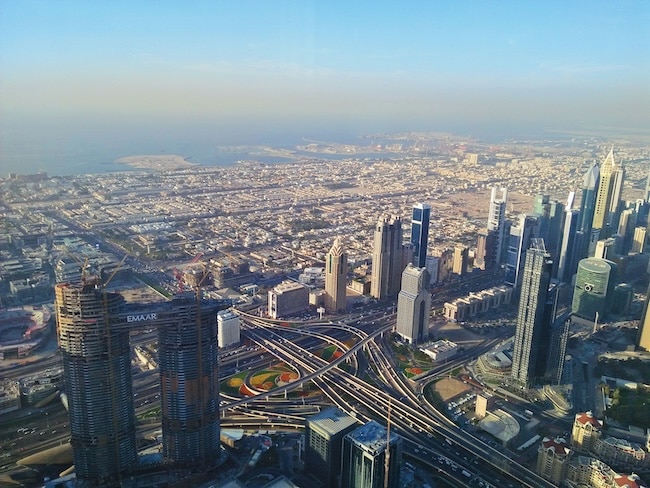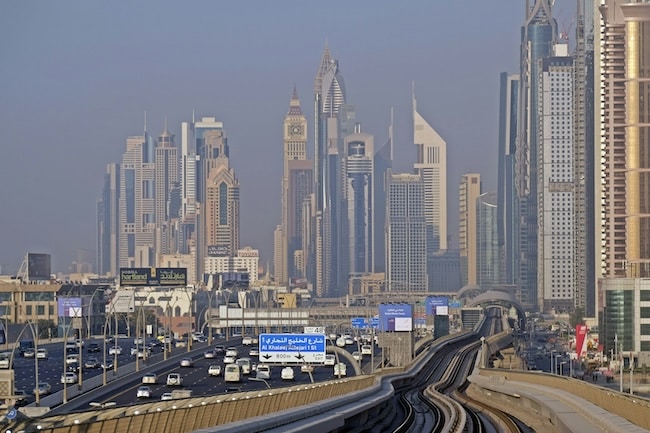The E11 freeway is a key element Dubai's road infrastructure.
Since 1980, this highway has linked Dubai to Abu Dhabi. It facilitates travel between these two major cities.
The quality and efficiency of the E11 route are major assets for residents and tourists alike.
Driving in Dubai may seem daunting for tourists, but with a few practical tips, it's quite doable.
For example, Dubai's roads are equipped with an automated toll system called Salik. This system makes it easy to pay tolls by passing under a barrier.
For visitors wishing to explore Dubai and the surrounding area, renting a car can offer unparalleled flexibility.
With a local navigator and a good understanding of road signs, discovering Dubai's many sights becomes an enjoyable and rewarding experience.
Key points
- The E11 freeway links Dubai and Abu Dhabi.
- Dubai's roads use an automated toll system, Salik.
- Renting a car offers great flexibility for exploring Dubai.
Planning your trip to Dubai
The information in this article comes from our team of local experts. Planning a trip to Dubai can be an exciting adventure.
It's important to understand Dubai's roads, prepare your budget, and consider events and weather conditions.
Understanding Dubai's roads
Dubai's road network is modern and well-maintained. Visit Sheikh Zayed Road is the main highway, crossing the city from northwest to southeast.
It connects many points of interest, including the business district of Jumeirah and theAl Satwa.
Roads and transport are managed by the Roads and Transport Authority (RTA). Traffic can be heavy at rush hour.
Avoid traveling at these times for a more pleasant experience. In addition, use maps and apps to stay informed about traffic conditions.
Budgeting and safety tips
When planning your trip to Dubai, take the cost of living into account.
Your budget will depend on your choice of accommodation, food and activities. Dubai uses the United Arab Emirates dirham (AED).
It is advisable to carry both cash and credit cards.
In terms of safety, Dubai is generally considered safe. However, it is advisable to respect the local culture and laws.
Avoid consuming alcohol outside authorized areas and take care when crossing roads, especially on freeways such as theEmirates Road.
Events and weather conditions
Dubai is known for its events, festivals and warm weather.
In summer, temperatures can exceed 40°C. Bring light clothing and drinks to keep hydrated.
In winter, the climate is milder, ideal for outdoor activities.
Popular events include the Dubai Shopping Festival and the Dubai International Film Festival.
They attract visitors from all over the world. It is advisable to book your accommodation and tickets in advance for these periods.
Information on specific freeways
Dubai's highways are crucial for connecting the various regions of the United Arab Emirates. Below you'll find detailed information on the main roads you're likely to use on your trip.
Sheikh Zayed Highway
The Sheikh Zayed Highway, also known as Sheikh Zayed Road, is one of Dubai's main arteries.
It links Dubai to Abu Dhabi and runs through the center of Dubai. It is an essential road for residents and visitors alike, offering easy access to major tourist attractions, skyscrapers and shopping malls.
It is around 55 km long. It often has several lanes in each direction, facilitating traffic flow, even at peak times.
To avoid Salik tolls, always have your RFID card or tag in order.
Sheikh Maktoum Highway
The Sheikh Maktoum Expressway, another key road, links Dubai's residential districts with major commercial areas.
Driving on this road provides access to many convenient amenities, such as schools, hospitals and leisure centers.
It is often less congested than Sheikh Zayed Road, making it ideal for the daily commute.
Don't forget to obey speed limits to avoid fines.
Sheikh Mohammed Bin Salem Highway
The Sheikh Mohammed Bin Salem Highway is a major road connecting the city of Ajman to Ras Al Khaimah.
Although less well known than others, it is crucial for those who live or work in the northern region of the United Arab Emirates.
This road is well maintained and offers a panoramic view on the coast and surrounding desert. It is particularly pleasant to drive in the morning and evening.
Hatta highway
The Hatta Highway links Dubai to the city of Hatta on the border with Oman.
This route is ideal for a quick getaway from the city, offering picturesque scenery and interesting stops along the way.
Keep an eye out for service stations and rest areas along the way. They're rare but well-equipped.
Emirates Route
The Emirates Route, also known as Emirates Road, is a highway linking Dubai to other emirates such as Sharjah, Ajman, and Fujairah.
It's an essential route for inter-emirate travel, often used by commuters and freight carriers.
It is equipped with numerous service areas and is often guarded for safety.
It's a convenient alternative to more congested roads like Sheikh Zayed Road.
Bus transport in Dubai
Bus transport is an important component of Dubai's transportation system.
The city has an extensive bus network covering both the main districts and more remote areas.
Buses in Dubai are modern, air-conditioned and equipped to accommodate passengers with special needs.
Bus routes are frequent and well-connected with other modes of transport, such as Dubai Metro.
Using the bus system is an economical and practical option for getting around the city with ease.
Frequently Asked Questions
Discover answers to frequently asked questions about Dubai highways, prepared by our team of local experts. Information is updated regularly to ensure accuracy.
How much does the toll between Dubai and Abu Dhabi cost?
The toll to travel between Dubai and Abu Dhabi generally costs AED 4 per Salik toll point. These points are located at key points on the main roads.
Fees are automatically deducted from your Salik account.
How does the Salik system work in Dubai?
The Salik system is a barrier-free toll system used in Dubai.
Each vehicle must have a Salik tag, which is automatically recognized and billed when it passes under a toll gate.
The fee is debited from your prepaid account linked to the label.
What are the speed limits on UAE roads?
Speed limits vary from road to road.
For example, on Sheikh Zayed Road, the limit is 100 km/h. On Emirates Road, it rises to 120 km/h, while on residential roads such as Jumeirah Road, it is 70 km/h.
Always obey traffic signs.
How do I drive on Sheikh Zayed Road in Dubai?
Sheikh Zayed Road is one of Dubai's most important roads, linking many key areas.
It is often very busy, especially during rush hour. Be careful when changing lanes, and keep to the posted speed limits.
A good knowledge of exits and routes makes the journey easier.
Is it easy for a newcomer to get around Dubai by car?
Getting around Dubai by car can be a challenge for newcomers.
Roads are wide and well-maintained, but traffic can be heavy. It's important to familiarize yourself with the local rules and to remain patient and vigilant.
Is Waze available and reliable for navigation in Dubai?
Yes, Waze is available and widely used in Dubai. It's a reliable option for navigation.
It offers real-time traffic updates and alternative routes to avoid traffic jams. The app is very useful for those unfamiliar with the city.
What to do in Dubai in 1 day, 2 days, 3 days, 5 days, a week?
Whatever the length of your stay, I invite you to download my special Dubai guide.
It's free and in PDF format.
All you have to do is tell me below which e-mail address you'd like to receive it at.
EDIT: you can't enter your email?
Take the quiz at the top of this article and you'll be able to register your email address to receive the special Dubai guide!


Leave a Reply